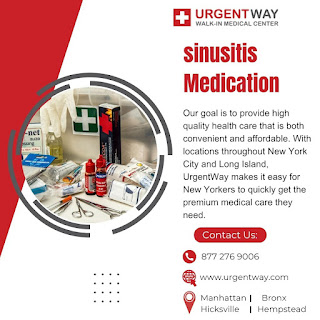How to Manage Chronic Sinusitis Cure, When Sleep Seems Elusive?
How to Manage Chronic Sinusitis Cure, When Sleep Seems Elusive?
Chronic
sinusitis is a crippling ailment that affects millions of individuals
worldwide. Persistent sinus inflammation can cause a variet
y of symptoms,
including nasal congestion, face discomfort, and trouble breathing, making it
difficult to obtain a decent night's sleep. In this detailed post, we will look
at how to cope with chronic sinusitis when it interferes with your sleep. We'll
share insights to help you find relief and reclaim your much-needed slumber,
from understanding the issue to practical recommendations and treatment
alternatives.
Chronic
sinusitis, also known as chronic rhinosinusitis, is a long-term inflammation of
the sinuses that lasts for at least 12 weeks. Nasal congestion, postnasal drip,
face discomfort, and headaches are common symptoms. These sensations frequently
intensify at night, interfering with your ability to sleep.
Influence on Sleep:
Sleep is
critical for general health and well-being. Chronic sinusitis can cause sleep
disruptions such as difficulties falling asleep, frequent awakenings, and poor
sleep quality when it interferes with your ability to breathe freely and
comfortably. As a result, midday weariness and decreased productivity occur.
Practical Sleep Strategies for People
with Chronic Sinusitis:
Maintain Good Sleep Hygiene: Create a regular sleep regimen by
going to bed and getting up at the same time every day, including on weekends.
A consistent schedule aids in the regulation of your body's internal clock and
enhances the overall quality of your sleep.
Elevate Your Head: Sleeping with your head elevated can
help decrease congestion and improve breathing. Consider utilizing an
additional pillow or purchasing a wedge pillow created specifically for this
purpose. Keeping your head slightly raised might help keep mucus out of your
sinuses.
Humidification: Dry air can aggravate the symptoms of
sinusitis. Adding moisture to your bedroom's air might help relieve dryness and
congestion. Humidifiers and vaporizers can be extremely beneficial, especially
during the dry winter months.
Nasal
irrigation with saline solutions can help remove mucus and relieve congestion.
Neti pots and saline nose sprays are useful aids for this. Use them before
going to bed to enhance your breathing and alleviate nocturnal discomfort.
Drugs and Allergen Control: Speak with your doctor about the best
drugs to manage your chronic sinusitis. In certain situations, they may include
decongestants, antihistamines, nasal corticosteroids, and antibiotics.
Furthermore, if allergens aggravate your symptoms, allergy management and
allergen control may be necessary to avoid nocturnal pain.
Make Your Bedroom Allergy-Friendly:
Allergens
such as dust mites and pet dander can aggravate the symptoms of chronic
sinusitis. Consider allergy-resistant pillowcases and mattress encasements. To
limit allergy exposure, wash bedding in hot water on a regular basis and vacuum
your bedroom.
Considerations for Diet: Certain foods and beverages might
aggravate sinusitis symptoms. Spicy meals, alcohol, and dairy products have all
been linked to an increase in mucus production and congestion. To increase
sleep quality, avoid these things close to bedtime.
Aromatherapy and Essential Oils: Aromatherapy and essential oils
provide relief for some people. Essential oils such as eucalyptus and
peppermint, for example, can assist open nasal passages and facilitate
breathing. When utilizing essential oils, be sure to adopt safe techniques such
as diluting them appropriately and using a diffuser.
Relaxation Techniques: Stress and worry can aggravate the
symptoms of chronic sinusitis. Deep breathing, progressive muscle relaxation,
and meditation are all relaxation practices that can help you calm your mind
and reduce tension, allowing you to sleep more easily.
Seeking Professional Guidance: Consultation with a Healthcare
Provider: If chronic sinusitis is interfering with your sleep and quality of
life, you should see a doctor. They can do a thorough assessment, identify the
underlying reasons of your problem, and prescribe advanced therapies or
surgical alternatives as needed.
Consultation with an allergist: Allergists can detect and manage
allergy triggers that may be worsening your sinusitis symptoms. Allergy testing
can help identify individual allergens, and allergists can offer tailored
therapies to alleviate sleep pain.
Polypectomy and Sinus Surgery:
In some
cases, individuals with chronic sinusitis may benefit from surgical procedures
like polypectomy or sinus surgery to improve sinus drainage and reduce
symptoms. Consultation with a healthcare provider is crucial to explore these
options.
Lifestyle Modifications and
Prevention:
Hydration and Diet: Drinking enough of water might help
thin mucus and relieve congestion. Consuming a vitamin and nutrient-rich diet
benefits your immune system and general health. As a result, the frequency and
severity of sinusitis symptoms may be reduced.
Exercise on a
regular basis improves circulation and immunological function, potentially
lowering the chance of sinusitis flare-ups. Exercise can also assist with
stress management, which can lead to sleep difficulties.
Environmental Changes: Examine your living space for
potential irritants. Removing sources of indoor pollution like tobacco smoking
and keeping adequate indoor air quality will significantly improve your
sinusitis symptoms.
Doctor of Sinus Infections at
UrgentWay Walk-In Clinic:
All UrgentWay
locations provide sinus infection treatment. We are open seven days a week,
from dawn to evening, so you may come in whenever it is convenient for you.
Our
knowledgeable experts will examine your health, recommend the best sinus
infection therapy, and advise you on prevention measures.
The severity
of the infections varies, and in some cases, extensive treatment is required.
However, in most situations, nonsteroidal anti-inflammatory medicines and nasal
decongestants are sufficient pain relievers. To clear the sinus infection,
antibiotics may be necessary.
If you are
experiencing the unpleasant symptoms of sinusitis and require immediate
treatment, come to UrgentWay in New York to visit our sinus infection treatment.
.png)



Comments
Post a Comment